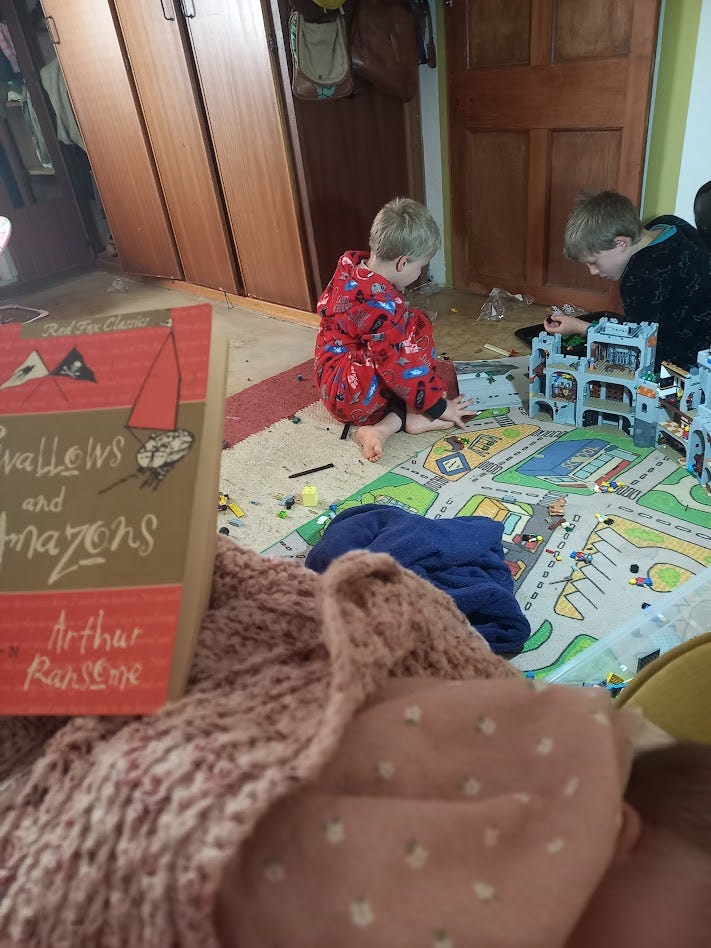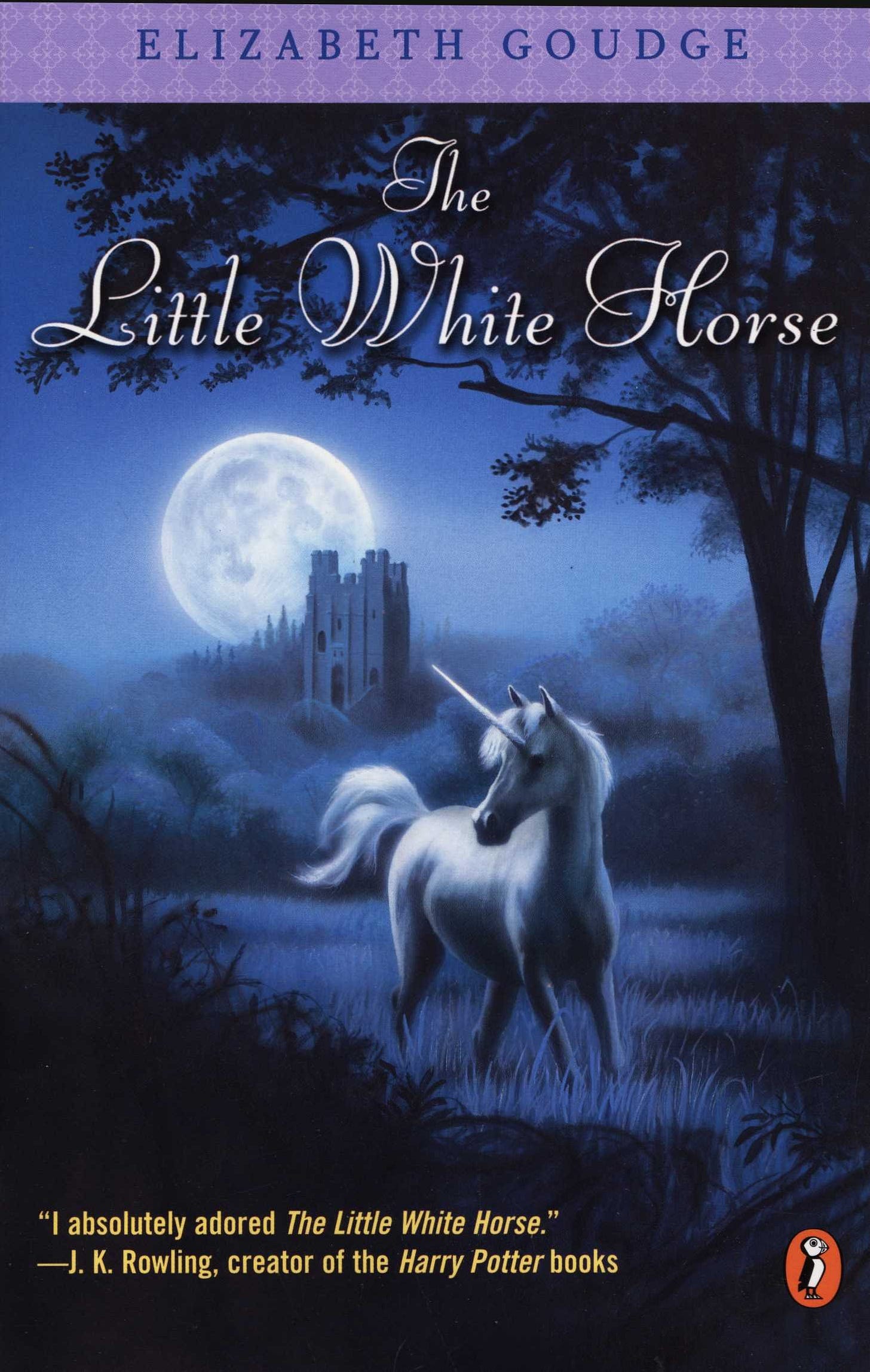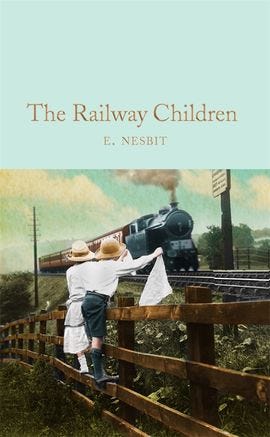The finest of virtues
Bravery in the Little White Horse, The Beatryce Prophecy, and The Railway Children
Welcome to The Just Beautiful Newsletter where I write about making space for beauty and justice to meet - lately, I’ve been noticing this in children’s literature. Due to my husband’s sudden death earlier this year, and a newborn, I can’t promise or predict what these essays will be! But they generally wander in the direction of children’s literature.
Courage! Courage! That’s the finest of all the virtues!”
— The Railway Children E. Nesbit
I read “The Little White Horse” by Elizabeth Goudge to the boys this month. The story starts pretty slowly - lots of descriptions of the setting, lots of descriptions of people, lots of descriptions of the food. However, about three quarters of the way through, the story shifts, and things begin to feel rather ominous. There’s no hugely obvious evil monsters, just some sinister people (called, “Them”, with a capital T) who roam the dark woods, trapping and stealing animals. Their leader, dressed all in black, prowls the forest with a black rooster on his shoulder. The sense of dread builds, and towards the climax of the book, Maria has to make her way through the forest to the castle that belongs to the men of the dark wood. There’s a vivid description of her nighttime ride through the forest, where her fear rises up and takes over, and makes the forest seem alive.
“She found herself riding with one arm raised to protect herself, and her mouth suddenly dry with fear. Once, when an unseen twig plucked at her hair, she thought it was a hand that plucked, and when a bramble caught her skirt, she felt that hands were trying to pull her off, and she had hard work not to cry out…”
“If there’s never any light, I don’t think I can bear it,” she thought. And then she said to herself that she must bear it. All things come to an end, even the night. Resolutely she lowered the arm she raised to protect herself, straightened her shoulders, and smiled into the darkness. And then, almost as though her smile had been a flame that set a lantern shining, she found she could see a little.”
There are dark woods in many a children’s story. Fairy tales are full of dark woods. Dark and full of danger. And eventually, all heroes must pass through them. Because many a children’s story is asking the same question: What does it mean to be brave?
In The Little White Horse we see Maria embody bravery in many forms - climaxing when she ventures into the dark woods in order to set right an age-old feud. Her bravery is not just of the sort that ventures into seemingly haunted woods. Maria confronts her uncle on his farming practices (she gets him to donate sheep’s wool to the church when she learns he is grazing his sheep at an abandoned monestary). She arranges tea parties (and marriages) between several characters. The whole book is one where Maria is mending every sort of broken relationship, both within her own family, her family history, and even the village and the surrounding country-side. There is also an abundance of good food (we now know definitively what a “parkin” is)— and the story ends with a massive tea-party-turned-banquet and THREE weddings, so one cannot doubt her bravery in mending her world ends happily ever after. I couldn’t help thinking of the biblical idea of “shalom” as I read it. Wholeness, a mending of broken relationships that extends not only to the spirit, but to the body and even the whole world. And it takes bravery.
My personal bed-time read this month was The Beatryce Prophecy by Kate DiCamillo. Most of DiCamillo’s books are about bravery, and of course this one was no exception. A monk with a wandering eye (it seems to be crooked, but it’s crookedness in a crooked world is what allows him to see things straight, to see everyday, ordinary things as beautiful) decides to plunge into the forest to rescue an orphan girl. Camillo’s style is decidedly more straightforward (we are absent pages of descriptions of room furnishings and an entire break-down of each day’s “repast” as we are in Little White Horse). I might say she goes as far as ‘telling’ rather than ‘showing’, but I’ll confess I don’t mind a bit of telling in a children’s story.
“What does it mean to be brave?” This was a question that Brother Edik asked himself as he walked through the dark woods with Jack Dory and Cannoc and Answelica.
To be brave is to not turn away.
To be brave is to go forward.
To be brave is to love.”
-Kate DiCamillo, The Beatryce Prophecy
The bravery to go forward into the darkness - and keeping going forward- of course made me think of Everything Sad Is Untrue by Daniel Nayeri1 . In the midst of this honest and raw portrayal of his life as an immigrant refugee kid, and the horror his mom survived, he says,
“I don’t know how my mom was so unstoppable despite all that stuff happening. I dunno. Maybe it’s anticipation.
Hope.
The anticipation that the God who listens in love will one day speak justice. The hope that some final fantasy will come to pass that will make everything sad untrue. Unpainful… if you have that, maybe you keep moving forward.”
I opened the newsletter with a quote from The Railway Children by E. Nesbit - but this throw-away line about courage being the finest virtue is actually embedded in a conversation between Peter, an eight-year-old boy, and his Mother. Their father is gone (wrongfully imprisioned, but Peter doesn’t know the details), the Mother is often busy writing and working in order to make ends meet, and doesn’t play or read with the children as much. Of course, the whole book is mostly full of the adventures the children have along the railway - from warning a train of a landslide on the tracks, saving it from disaster, to rescuing a boy with a broken leg. Their adventures often require bravery. But in conversations like this one, we see another sort of bravery that is required. The bravery to go on in life when things are hard. Because some things are true whether it feels like they are true or not. And the true things can help us keep going.
I love Mother’s honesty. I felt like she took the words right out of my mouth:
“Wouldn’t you like to be writing a book with us all in it, Mother, and make Daddy come home soon?”
Peter’s mother put her arm around him suddenly, and hugged him in silence for a minute. Then she said:
“Don’t you think it’s rather nice to think that we’re in a book that God is writing? If I were writing a book, I might make mistakes. But God knows how to make the story end just right— in the way that’s best for us.’
“Do you really believe that Mother?” Peter asked quietly.
“Yes,” she said. “I do believe it— almost always— except when I’m so sad I can’t believe anything. But even when I can’t believe it, I know it’s true— and I try to believe it. You don’t know how hard I try. Now, take the letters to the post and don’t let’s be sad anymore. Courage! Courage! That’s the finest of all the virtues!”
May we all have courage this week to keep going forward in love and hope.
xx- Steph
PS: I don’t have a curated list of anything for paid subscribers this week… did I mention I have a newborn? :) But writing has always been a sanity- giver for me, and I’m grateful I had the time this month to synthesize some of my reading life over here! Thanks for reading with me.





You are showing bravery....I pray you are blessed even as you seek the good of your children.
Praying and asking His care daily.
The passages in bold feel like medicine. Thanks for this missive 💛